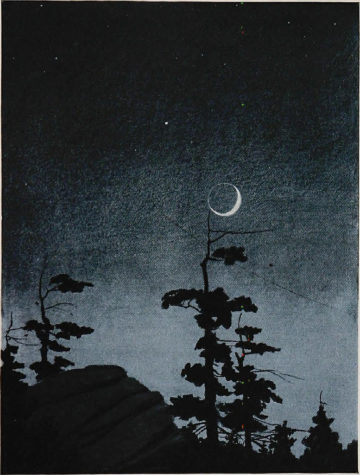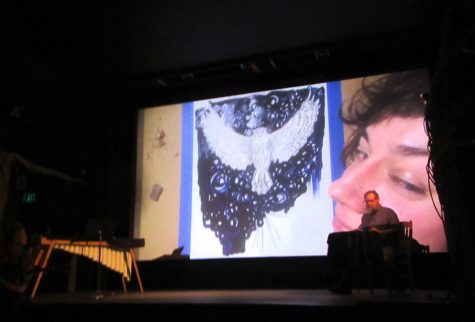
Last night I went out with my kids to see the new Star Wars movie, followed by an hour and a half drive home along rivers and over a Colorado pass late at night. A car or two came by every twenty minutes or so. As my two boys slept in their pillows of jackets, stars filled the top of my windshield. Just past the new moon, the night was pitch dark.
Keeping myself alert, I thought about the movie we’d just seen, and how fitting it was to go out for an epic tale this time of year. A long time ago in a galaxy far, far away, and other heroic tales, are best said around the winter solstice when the earth’s maximum axial tilt puts the northern hemisphere the farthest away from the sun. These are the longest nights of the year, and some of the coldest. Holidays cluster around the date (this year on Dec. 21) like wishes for the sun’s return. This is when we gather in close. Our voices carry us through the dark, reminding us that we are not alone; we are not ghosts, not yet.
In many indigenous traditions, the most important legends are saved for winter, and some have taboos against summer tellings. Folklorists and ethnologists who’ve gathered Native American legends have sworn to repeat them only in winter.
Poet Ramson Lomatewama, from Hopi in northern Arizona, said in a 2002 radio interview that this time of the year is “filled with mystery and power, because this is a time of reverence and respect for the spirits.”
Navajo coyote stories, which often involve creation legends — how stars got in the sky, for instance — are full of trickery and strange, almost hallucinatory episodes. They are to be told only in winter. The coyote story-telling season ends with the first lightning strike of spring, and begins again with the first hard frost. Same as Navajo, Iroquois on the other side of the continent start telling stories with the first killing frost.
Following suit, every winter I rent stage space and bring in dancers, story-tellers, orators, and musicians. I came out of one of these performances last weekend at an old, creaky theater in Paonia, Colorado. This is the 9th year I put on winter performances on this stage, something a few friends and I pulled together because we thought it was the right season, something the community needed. We started with a late night event, one friend on guitar, another playing DJ, and me doing spoken word. Twenty people showed up to that event. Now, it’s pretty much sold out for two nights, capacity of 200 in the theater, people coming from hundreds of miles away, cast and crew of 10 or 15 depending on the year. It turned out to be just the right thing to do.
This year at the Paonia event, I spoke of driving over the same pass I would take with my kids after Star Wars. The story I told came from a couple decades ago when I lived in a tipi. Our own Sarah Gilman from Last Word on Nothing supplied a time-lapse of a sketch she made of the tipi, which she turned upside-down and morphed into an owl with wings outspread, projected on the screen behind me.

The night I described was a blizzard where I was coming back from a dance party in the nearby town of Telluride. I’d needed the company, relishing flashing lights, loud music, and a woman who bumped into me and bit my ear, then gave me a wry smile before disappearing into the crowd. Coming home that night, I was alone in heavy snow and bewildering moonlight, traveling by skis to get back to my tipi. Boughs of ponderosa pines dropped their snow loads like sacks of flour. When I couldn’t find the tipi, I realized I was lost. My trail had been obliterated by snowfall. Nothing seemed familiar. Every tree trunk looked the same as the last, and the moonlight felt more inky than milky, as if I’d passed from the night I was in into a story or a legend.
I was afraid I might not find the tipi, or be able to return to the road and get in my truck. I feared I might have to shelter in the snow, which can easily become life threatening. That’s when I stopped and pulled up a corner of my wool cap, hearing something. It was a great horned owl, a low stuttering intonation followed by nothing but the sound of wind. Omen, I thought. Death.
Maybe not death, though. When I heard it call again, I used it as a compass point. The owl wasn’t flying anywhere on a night like this; I could rely on its position. I made a grid around the owl so I wouldn’t repeat my backtracking, and soon found the tipi. I dug out the canvas door, climbed in, and touched a match to the wick of an oil lamp. Soon the wood stove was fired up and crackling. Warmth rose inside the 20-foot-wide canvas cone as I sat in a rocking chair and listened to snow pile onto canvas, and the call of the owl, which seemed meant for me.
Something wouldn’t be as right telling this same story in the summer. Why cast such a shadow on warm nights when you can lie in the grass, head cradled in your hands, counting shooting stars?
The pass I drove to get to my tipi was the same pass I took last night, kids asleep with visions of Luke Skywalker and Princess Leia dancing in their heads. The sky was clear and starry, headlights sweeping around curves and stream bends. At times it didn’t feel like just a night. It felt like a story, a moment tied to many others and worth reciting.
Image: Walter Prichard Eaton, In Berkshire Fields, 1920.
Photo: by Daiva Chesonis of Sarah Gilman on screen and me reading last weekend.
Thanks for staying up late and penning a few for us.
Lovely. Wonderful. Thank you.
Thank you – we need more stories in our lives
Nice
This is a wonderful story, and you tell it so well. And, it would not have the same impact if told around a warm summer evening. I told my Mom about your stories at Dark Nights, and she is now reading Finders Keepers – you have a new 92 year old fan!!
I love being told stories. Yours hit the mark on this cold day the day before winter’s solstice. I went to Star Wars last night. Upon returning home I stood outside and took in the sky full of stars, grounding me to the hear and now and to reaching to the heavens and beyond, all of which I belong in every moment. It left me feeling gratitude for the lack of star destroyer’s and the immensity of all there is. Thanks for the reminder to nature being ones compass.
Thank you, Craig. Nice to read and feel your thoughts when the antithesis can become smothering. We really need your fresh, crisp nostalgia.
Thank you for this story. I feel like I had been curled up next to thw fire listening to you tell this aloud…so poignant…. The oral tradition and perspective from tribal tradition around winter solstice is so refreshing and rings so true.